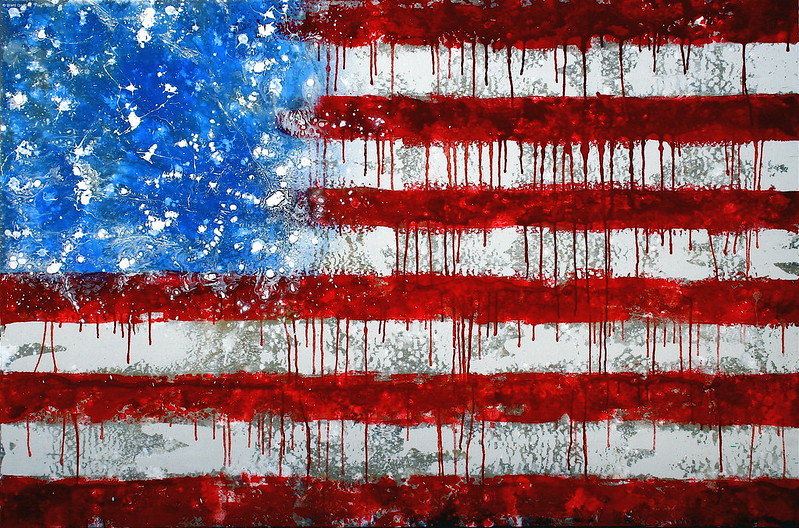Thoughts On the National Day of Prayer

Thoughts On the National Day of Prayer
Brian Zahnd
A few years ago, I was invited to speak on prayer at a Christian school on the National Day of Prayer (an observance established in 1952 during the Cold War Era). As you might have guessed I’m less than enthusiastic about the National Day of Prayer, mainly because of its tendency to turn into the Day of Nationalistic Prayer. I would rather we observe Ascension Day as a global day of prayer. Ironically these two days occasionally coincide, and it’s telling that the American National Day of Prayer easily overshadows observing the Ascension of Christ to reign over all the nations. But despite my ambivalence toward the National Day of Prayer, it was less trouble for me to accept the invitation than to decline. The student assembly was held in the gymnasium, and before I spoke the students were to recite the Pledge of Allegiance and the Lord’s Prayer. The Pledge of Allegiance came off without a hitch — every student recited it flawlessly, complete with a hand-over-heart liturgical gesture. But the Lord’s Prayer was another story; in fact it was a bit of a fiasco. The students in this private Christian school didn’t know the Lord’s Prayer. So a student was pressed into service to read it so he could lead the student body through it line by line in “repeat after me” fashion. It was embarrassing. I turned to the faculty member assigned to host me saying, “It’s not that this Protestant Christian school doesn’t believe in liturgy, you just don’t believe in Christian liturgy; your students know their American liturgy quite well.” It was a harsh assessment on my part, but the faculty member could only sheepishly agree.
Christians can and should be productive citizens within the particular nation they happen to have residence; they should pray for political leaders and pay their taxes; they can vote and participate in public service and contribute to the public good. But they should not labor under the delusion that the nation itself can be Christian. Only that which is baptized can be Christian, and you cannot baptize a nation-state. This was the misguided and now abandoned aspiration of Christendom. And in the American experiment the United States deliberately broke with the Christendom practice of claiming to be a Christian nation with a state church. It was America that pioneered the experiment of secular governance. America is not a Christian nation; it never was and never can be. The only institution that even has the possibility of being Christian is the church. When we confuse the nation with the church, it may not do any particular damage to the nation, but it will do irreparable harm to the church. When we reach for the sword of violent power, we let go of the cross of Christian discipleship. To be Christian implies an intentional attempt to imitate the one who would rather die than kill his enemies. Whatever it means to be Christian, it would clearly preclude maintaining a trillion-dollar war machine. I’m sure the Joint Chiefs of Staff would agree that you cannot run the Pentagon according to the Sermon on the Mount.
When we admit it’s impossible to govern according to the Sermon on the Mount, we also admit it’s impossible for a nation that maintains a nuclear arsenal to be Christian. To contend that America could not survive without nuclear arms is to make my point. The people of God are sustained by the Holy Spirit, not hydrogen bombs. We have no warrant to hope for a Christian nation (as we conceive of nations); it’s enough to hope for a Christian church. Only that which is capable of embodying the Sermon on the Mount has the possibility of being Christian. Some have tried to lessen the demands of discipleship by adopting Luther’s “Two Kingdoms” theology, but this only leads to divided loyalties and a compromised Christianity. How do you have two kingdoms without two kings? When you understand that Christ means king…well, you see the problem. What ends up happening is Christ being reduced to a “spiritual” king (whatever that is), while the state is made the real king. Let’s just say that Luther’s “Two Kingdoms” experiment did not end well in Germany.
Despite abundant testimony from church history that ecclesial entanglement in the agenda of empire always leads to a compromised Christian witness, much of the American church is resolute in being tangled up in red, white, and blue. Today religious nationalism (which is disturbingly connected with white nationalism) is on the rise. In such an environment the church faces a stark choice: Will we comport ourselves as pious promoters of religious nationalism, or will we summon the courage to act as a prophetic witness against the idolatry of nationalism? Will we remain tangled up in red, white, and blue, or will we lash ourselves to the cross of Christ and willingly endure whatever suffering that may demand of us? One of the most vital things an American Christian can do right now is resist the hijacking of Christian faith by American nationalism. We need to make it abundantly clear that “America First” is incompatible with a global church whose mission it is to announce and embody the kingdom of Christ. The Nicene Creed teaches us that the baptized are to confess that “we believe in one holy catholic and apostolic church,” not in a compromised and nationalistic church. Now is not the time for gaudy star-spangled Christianity; now is the time to wash our robes in the blood of the Lamb so that we can live as citizens of New Jerusalem.
BZ
(This is from Postcards From Babylon, pp. 45-47)